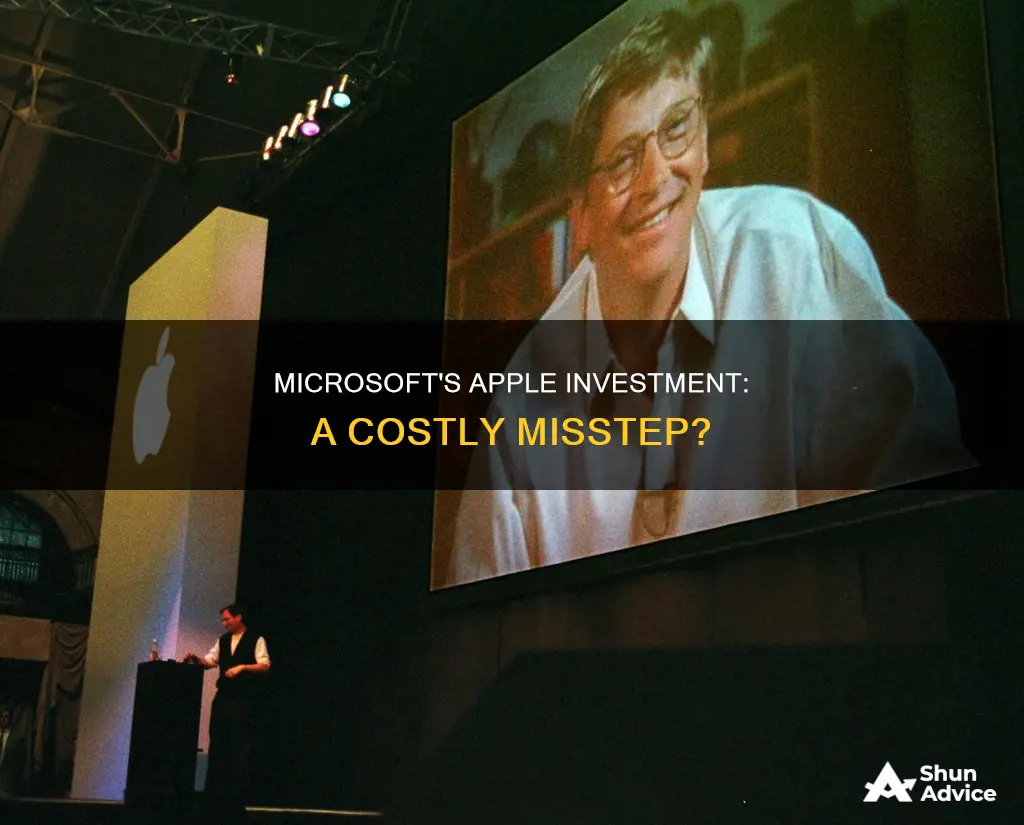
In 1997, Microsoft invested $150 million in Apple, its biggest competitor at the time. Apple was on the brink of bankruptcy, and the deal was mutually beneficial: Apple got a much-needed cash injection, and Microsoft was able to keep a weakened competitor afloat, thereby alleviating concerns about monopolising the market. By 2001, Microsoft had converted its shares into common stock, netting approximately 18.1 million shares of Apple. However, by 2003, Microsoft had sold its entire stake in Apple. If Microsoft had held on to those shares, they would be worth around $159 billion today. This has led some to question whether selling their Apple shares early was a mistake by Microsoft.
| Characteristics | Values |
|---|---|
| Year of investment | 1997 |
| Amount of investment | $150 million |
| Investor | Bill Gates, Microsoft CEO |
| Investee | Apple |
| Apple's worth at the time of investment | $3 billion |
| Apple's worth as of 2025 | $700 billion |
| Apple's share price at the time of investment | $0.2–$0.3 |
| Number of shares received by Microsoft | 150,000 |
| Type of shares | Non-voting preferred stock |
| Outcome of the investment | Saved Apple from bankruptcy |
What You'll Learn

Microsoft's $150 million investment in Apple
In 1997, Apple was on the brink of bankruptcy. On August 6, Bill Gates and Microsoft stepped in with a $150 million investment in exchange for shares in the company. This was a highly controversial move as, at the time, the two companies were direct competitors. When Steve Jobs announced the investment at the Macworld Boston conference, the audience booed Gates' appearance.
The deal was mutually beneficial. Apple got some much-needed cash, and Microsoft was able to keep a weakened competitor afloat, thereby alleviating concerns about the company's monopolistic power. As part of the deal, Apple also agreed to drop a lawsuit accusing Microsoft of copying its operating system.
The investment netted Microsoft 150,000 shares of preferred stock, convertible to common shares of Apple stock at a price of $8.25, redeemable after a three-year period. By 2001, Microsoft had converted all of its shares into common stock, netting the company approximately 18.1 million shares. However, by 2003, Microsoft had sold its entire stake in Apple for $550 million.
If Microsoft had held on to its Apple shares, they would be worth significantly more today. Apple stock has split twice since the agreement, once in 2000 and again in 2005. Assuming that Microsoft's shares would have split only once, the company would have had 36.2 million shares. With Apple's current share price, those shares would be worth billions.
While the investment may have been a good short-term decision, some have argued that it was a mistake in the long run. Former Microsoft CEO Steve Ballmer has called the investment "crazy," acknowledging that it helped Apple become the most valuable company in the world and outcompete Microsoft.
India's Domestic Investment: Measuring the Metrics
You may want to see also

Apple's resurgence and market domination
In 1997, Apple was on the brink of bankruptcy. On August 6, Bill Gates and Microsoft stepped in with a $150 million investment in exchange for shares in the company. This was a mutually beneficial deal, as Apple received a much-needed cash injection, and Microsoft was able to keep a weakened competitor afloat, allaying concerns about its monopolistic power.
Since then, Apple has enjoyed an unparalleled resurgence, rising from near bankruptcy to become one of the most valuable companies in the world. This resurgence can be attributed to several key factors. Firstly, the deal allowed Apple to stabilise its floundering Mac business and create the iPod, which was a huge success. Secondly, Apple's innovation and design prowess, exemplified by the subsequent launches of the iPhone and iPad, revolutionised personal computing habits and dealt a significant blow to Microsoft.
The success of these products propelled Apple to market domination. By 2011, the year of Steve Jobs' death, Apple's market capitalization had reached $839 billion, surpassing Microsoft's at $560 billion. This marked a significant shift in the industry, as Apple had been worth less than $3 billion when it received the investment from Microsoft.
Discretionary Investment Management: Expert-led Financial Strategies
You may want to see also

Microsoft's sale of its stake in Apple
In 1997, Microsoft invested $150 million in Apple, which was on the brink of bankruptcy. This deal was part of a broader patent cross-licensing agreement, which included Microsoft's promise to support Microsoft Office for the Mac for five years, while Apple agreed to make Internet Explorer the default web browser on the Mac. Microsoft also received 150,000 shares of preferred stock, convertible to common shares of Apple stock at a price of $8.25, redeemable after a three-year period.
By 2001, Microsoft had converted all of its shares into common stock, netting approximately 18.1 million shares. However, by 2003, Microsoft had sold its entire stake in Apple. This decision by Microsoft turned out to be a missed opportunity in retrospect. If Microsoft had held on to its Apple shares, they would have increased significantly in value. At Apple's share price of $604.59 in 2014, Microsoft's shares would have been worth $21.86 billion. With subsequent stock splits and Apple's rising share price, the value of Microsoft's investment would have grown even further.
The sale of its stake in Apple by Microsoft can be seen as a strategic move to divest its holdings in a competitor. However, with Apple's remarkable resurgence and growth, it is clear that Microsoft potentially missed out on significant gains by selling its shares too early.
Managing Investment Biases: Strategies for Objective Financial Decisions
You may want to see also

The impact of Steve Jobs' leadership
Steve Jobs' leadership style was a key ingredient in Apple's success. Jobs co-founded Apple in 1976 and, after being ousted in 1985, returned to the company in 1997 to rescue it from near bankruptcy. By the time of his death in 2011, Apple was the world's most valuable company.
Jobs' biographer, Walter Isaacson, notes that Jobs' personality was integral to his way of doing business. Jobs could be arrogant, dictatorial, and mean-spirited, yet he was also a great leader. Jobs' leadership style was situational, and his genius in design, combined with his clear vision for the company, created a "higher purpose" that excited Apple employees.
Jobs had a passion for the company and its products, and employees trusted him because he demonstrated his competence, especially in product design and marketing. Jobs showed that he was not driven by his ego or self-interested needs, which helped employees view his negative behaviours in the context of his underlying positive qualities.
Jobs emphasized the importance of teamwork and believed that a company's greatest asset is its people. He also knew that innovation is what distinguishes a leader from a follower. Jobs had a unique intuition when developing products, and he considered every aspect of the consumer's product experience, right down to the packaging.
Under Jobs' leadership, Apple developed numerous innovative products, including the iPod, iPhone, iPad, and iTunes. These products revolutionized mobile communications and music, and how numerous industries carried out their everyday operations. Jobs also helped transform several industries, including personal computing, animated movies, music, phones, tablet computing, retail stores, and digital publishing.
Jobs' impact extended beyond Apple. He is recognized for making positive impacts in several areas, including helping the environment by creating products that save trees and promote a "paperless" culture. The iPhone, for example, gave individuals more freedom in their professional and personal lives.
Jobs' approach to innovation and business continues to offer entrepreneurs industry-agnostic inspiration more than a decade after his death.
Savings and Investments: Economy's Growth Engine
You may want to see also

The competitive dynamics between Apple and Microsoft
In the 1990s, Microsoft and Apple were direct competitors in the personal computing market. Microsoft was the dominant player, with 9 in 10 computers running on its Windows operating system. However, Apple was a much smaller company, valued at less than $3 billion, and was on the brink of bankruptcy.
In August 1997, Microsoft invested $150 million in Apple, receiving 150,000 shares of preferred stock in return. This investment was part of a broader agreement between the two companies, which included a patent cross-licensing agreement and a promise from Microsoft to support its Office software on Macs for five years. Apple, in turn, agreed to make Internet Explorer the default browser on its machines.
The deal was mutually beneficial. Apple received a much-needed cash injection, while Microsoft was able to keep a weakened competitor afloat and alleviate concerns about its monopolistic power. At the time, the deal was seen as surprising and even surreal, with the two companies known for publicly ridiculing each other and engaging in legal disputes.
Following the investment, Apple enjoyed a remarkable resurgence, rising from the brink of bankruptcy to become one of the most valuable companies in the world. By 2001, Microsoft had converted its shares into common stock, netting approximately 18.1 million shares. However, by 2003, Microsoft had sold its entire stake in Apple. If Microsoft had held on to its shares, they would be worth billions today.
Despite the initial cooperation, the competition between the two companies continued. Apple's success with the iPod, iPhone, and iPad revolutionised personal computing habits and challenged Microsoft's dominance. Apple's market capitalization surpassed that of Microsoft, and it became a trillion-dollar company. The dynamic between the two companies has shaped the computing industry, with both cooperation and competition playing a role in their respective trajectories.
Investment Management Lawyers: Guiding Your Financial Journey
You may want to see also
Frequently asked questions
Former Microsoft CEO Steve Ballmer has admitted that investing in Apple was probably a mistake. In 1997, Apple was almost bankrupt and Microsoft's $150 million investment helped Apple recover and become the world's most valuable company.
In 1997, Apple was on the brink of bankruptcy. Microsoft's investment was part of a broad patent cross-licensing agreement and a promise from Microsoft to provide its Office software to Macs in exchange for Internet Explorer being the default browser on Apple's machines. The deal also helped Microsoft alleviate concerns about monopolising the market.
In exchange for its $150 million investment, Microsoft received 150,000 shares of preferred stock in Apple, convertible to common shares at a price of $8.25, redeemable after a three-year period. By 2001, Microsoft had converted all of its shares into common stock, netting approximately 18.1 million shares.
No, by 2003, Microsoft had sold its entire stake in Apple. If Microsoft had held on to its shares, they would have been worth billions more.







